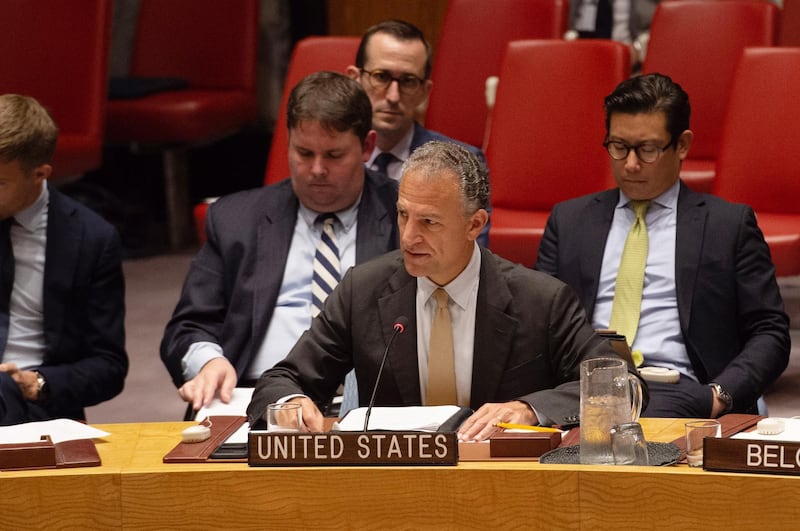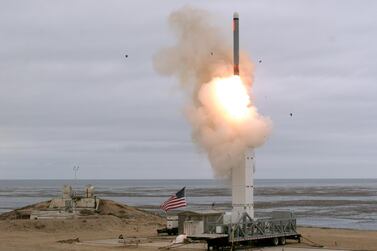Hostile exchanges on Thursday at the UN Security Council between Russia and the US over an American missile test showed how disunity is adding to a sense of impotence on issues handled by the world body's leading nations.
The US confirmed on Monday that it had tested a mid-range, ground-launched cruise missile of a type banned under the 1987 Intermediate-Range Nuclear Forces treaty with the Soviet Union, a day earlier.
The Trump administration announced on August 2 its withdrawal from the accord, having repeatedly accused Russia of breaking it.
Many states and proliferation experts believe the end of the treaty will lead to a new and dangerous nuclear arms race. Russia and China, two of the council's five permanent members, called Thursday's meeting of the council in New York.
They said the American test, from the US Navy-controlled San Nicolas Island off the coast of Los Angeles, was a threat to international peace and security.
But Moscow's critics said the council hearing was orchestrated to try to publicly embarrass the US, a claim Russia's deputy permanent representative to the UN denied.
“We didn't call this meeting to expose the hypocrisy of our American colleagues,” Dmitry Polyanskiy said.
“Today, it is obvious to any old non-biased disarmament expert that this is an incontrovertible fact.
"However much they might harp today that it was the actions of Russia that undermined the INF treaty, the most recent steps taken by Washington are evidence to the contrary.”
Mr Polyanskiy said “stubbornness” from European countries, for not criticising the US missile test was the reason for ordering the meeting.
The treaty had banned all land-based missiles, conventional and nuclear, that could travel between 500 and 5,500 kilometres, to abolish a class of nuclear arms being deployed by the US and the Soviet Union that left Europe the most threatened.
“Do you really not understand that what you've done with the Americans is that you are step by step returning to a historical situation when missiles were targeting European cities from different sites?” Mr Polyanskiy asked.
“We would not be the first to make use of such measures. But considering that our American colleagues are rubbing their hands and want to flex their muscles, it's possible that the situation I describe could happen quite soon.”
The US missile did not have a nuclear warhead but he said the launch was a sign that the Pentagon was increasing its nuclear war capabilities, which President Donald Trump has often touted as necessary.
Ambassador Jonathan Cohen, the US acting permanent representative to the UN, said that withdrawal from the treaty had come more than a decade after Russia began breaking its obligations by testing missiles with an outlawed range.
“Over the past several years Russia developed, produced, flight-tested and now has fielded multiple battalions of its INF non-compliant M9729 missile system,” Mr Cohen said.
He described Sunday's test as prudent and non-threatening.
“In response earlier this month, and after six years of US diplomacy, to return Russia to compliance and to preserve the treaty, our secretary of state affirmed the US withdrawal from the INF treaty," Mr Cohen said.
"The US will not remain a party to a treaty that is deliberately violated by Russia.
“We are here today because the Russian Federation preferred the world in which the US continued to fulfil its INF treaty obligations while the Russian Federation did not.”
He said China had also threatened to target US allies that host any American missiles, “even though China has already deployed thousands of intermediate-range missiles with the purpose of holding the US and our allies and partners at risk”.
Britain, France and Germany all blamed Russia for the treaty's collapse, with the UK saying it supported the US exit.
Several non-permanent members of the council, however, warned that the row was a symptom of disintegration at the top of the world order.
Instead of finding solutions to crises such as the eight-year war in Syria, permanent members of the council are bickering among themselves, said Marc Pecsteen de Buytswerve, Belgium's ambassador.
“These recent developments show the polarisation that exists currently within the international community, where trust and co-operation between states is in deep regression,” Mr de Buytswerve said.
“Our debate cannot be limited to accusations and recriminations.
"It is important for Russia and the United States to engage in an active and constructive dialogue in order to agree upon measures for stabilisation and for the re-establishment of trust.
“A new arms race is not in anyone's interest.”
Richard Gowan, an analyst and UN director at the International Crisis Group, said while Thursday's meeting was “diplomatic showmanship” by Russia and China, designed to deflect criticisms of their own missile programmes, many UN members believed it was fair to talk about the US missile test.
“But I worry that it points to real dangers for the future of the Security Council,” Mr Gowan said.
“If the P5 [permanent members] become increasingly confrontational over each others' missile and nuclear programmes, they will be less likely to co-operate on other non-proliferation issues.”






